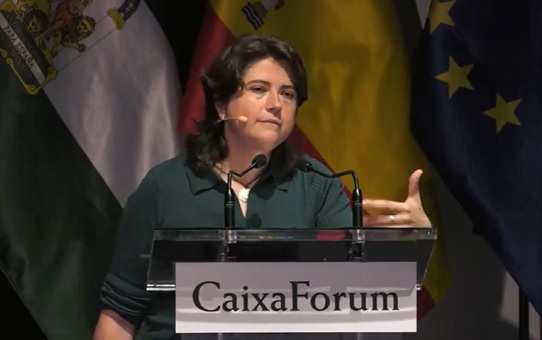GenTIC researcher Lídia Arroyo participated as a guest speaker at the International Conference on Economics and Public Budget for equal opportunities between men and women, organized by the Institute of Studies on Public Finance of Andalusia (IEHPA) and the Ministry of Economy, Treasury and European Funds of the Regional Government of Andalusia on the 14th of December 2022. The event gathered academic experts, public administration managers, and representatives of social entities to discuss the challenges and opportunities for gender equality in the context of digitization after the COVID19 pandemic and to reflect on the role of public budgeting with a gender perspective to reduce inequalities.
Lídia Arroyo’s communication focused on the key issues for achieving gender equality in the digital society and analysed the evolution of the various digital gender gaps at the European and national levels. The researcher pointed out in her speech how gender inequalities are reproduced in the uses of the Internet. “Women seek more information about health issues, a topic related to care, whereas men use the Internet for reading news and press articles”, she said. In addition, Lídia Arroyo emphasized that nowadays technology is mostly produced by men, including free software, and explained that this digital divide implies the exclusion of women not only from the development of technologies but also from the subsequent use of these applications.
Regarding the consequences of existing gender inequalities in the digital society, Lídia Arroyo affirmed that women perceive lower salaries and are affected by more precarious working conditions as well as being underrepresented in decision-making positions linked to the generation of new knowledge. The researcher also referred to the debate on the future of work and analysed from a gender perspective the required professional skills in relation to the economic and societal challenges after the COVID19 pandemic. In that regard, she highlighted the importance of the care sector and stated that not only digital skills, but also soft skills are crucial.
To conclude, Lídia Arroyo presented proposals for digital policies to reduce gender inequalities at three levels: redistribution, recognition, and representation. “Feminism must be integrated into the digital agenda to create inclusive contents and promote an egalitarian digital society for all”, she affirmed.
Together with Lídia Arroyo’s guest communication, the IEHPA Conference on Economics and Public Budget included a round table with relevant experts on gender equality and digitization as Nuria Oliver, technology director and co-founder of ELLIS Alicante Foundation, and Ana Ceballos, Deputy Director of Planning and Strategy of the Digital Agency of Andalusia.
Watch the video of the IEHPA Conference here:
